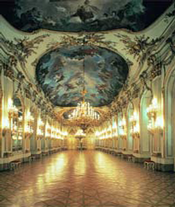
21 Oct 2007
MOZART: Der Schauspieldirektor
Der Schauspieldirektor [The Impresario], Singspiel in one act, K486.
Mozart and Salieri, an opera in one act consisting of two scenes.
Nicolai Rimsky-Korsakov (1844-1908), composer. Libretto derived from Alexander Puskhin's play of the same name.
First performance: 7 December 1898 in Moscow.
Ariadne auf Naxos, Oper with a prologue and one act. Music composed by Richard Strauss. Libretto by Hugo von Hofmannsthal.
La Vestale, a tragédie lyrique in three acts.
Boris Godunov, an opera in four acts with prologue
Modest Mussorgsky, composer. Libretto by the composer, based on Alexander Pushkin's drama Boris Godunov and Nikolai Karamazin's History of the Russian Empire
First performance: 8 February 1874 at the Mariinsky Theatre, St. Petersburg
Il Trovatore, dramma in four parts.
Only a few months following the premiere of Der Rosenkavalier, Hugo von Hofmannsthal proposed a new opera to Richard Strauss based on Molière’s comedy-ballet, Le Bourgeois gentilhomme (in German, Der Bürger als Edelmann).
Die Entführung aus dem Serail, Singspiel in 3 Acts.
Music composed by Wolfgang Amadeus Mozart (1756–1791). Libretto by Johann Gottlieb Stephanie the Younger, based on an earlier libretto by
Christoph Friedrich Bretzner.
Die Entführung aus dem Serail, Singspiel in 3 Acts.
Music composed by Wolfgang Amadeus Mozart (1756–1791). Libretto by Johann Gottlieb Stephanie the Younger, based on an earlier libretto by
Christoph Friedrich Bretzner.
Arabella: Lyrische Komödie in three acts
Die Entführung aus dem Serail, Singspiel in 3 Acts.
Music composed by Wolfgang Amadeus Mozart (1756–1791). Libretto by Johann Gottlieb Stephanie the Younger, based on an earlier libretto by
Christoph Friedrich Bretzner.
La Gioconda, dramma lirico in four acts.
Music composed by Amilcare Ponchielli (1834–1886). Libretto by Arrigo Boito (under the pseudonym Tobia Gorrio), based upon Victor Hugo's Angelo, Tyrant of Padua (1835).
Don Carlo, an opera in four acts. Music composed by Giuseppe Verdi (1813–1901). Libretto by Joseph Méry and Camille Du Locle after Friedrich von Schiller’s dramatic poem Don Carlos, Infant von Spanien. Revised version in four acts (French text revised by Du Locle, Italian translation by Achille de Lauzières and Angelo Zanardini).
Un ballo in maschera, a melodramma in three acts.
Music composed by Giuseppe Verdi. Libretto by Antonio Somma, based upon the work of Eugène Scribe Gustave III ou Le bal masqué (1833)
Medea: Melodramma tragico in three acts.
Die Tote Stadt, an opera in three acts.
Music composed by Erich Wolfgang Korngold (1897-1957). Libretto by Paul Schott (Julius and E. W. Korngold) after the novel Bruges la morte by Georges Rodenbach.
Some Details concerning the Revolution inaugurated by Rossini
Manon Lescaut, dramma lirico in quattro atti
Elektra: Tragedy in one act.
Lyric Opera of Chicago has announced both schedules and cast-lists for is Spring 2020 performances of Richard Wagner’s Ring Cycle. Given the series of individual productions already staged by the company since Fall 2016, that pave the way for the complete cycle, Lyric Opera of Chicago’s complete production should affirm the artistic might of the great composer.
“Diacono himself does not know what musical talent he possesses” – Mascagni

Der Schauspieldirektor [The Impresario], Singspiel in one act, K486.
Music composed by W. A. Mozart. Libretto by Gottlieb Stephanie the younger.
First Performance: 7 February 1786, Schönbrunn, Orangery
| Characters: | |
| Frank, an impressario | Speaking role |
| Eiler, a banker | Speaking role |
| Buff, an actor | Speaking role |
| Herz, an actor | Speaking role |
| Madame Pfeil, an actress | Speaking role |
| Madame Krone, an actress | Speaking role |
| Madame Vogelsang, an actress | Speaking role |
| Vogelsang, a singer | Tenor |
| Madame Herz, a singer | Soprano |
| Mademoiselle Silberklang, a singer | Soprano |
Setting: an impresario’s room in Salzburg, 1786.
Synopsis:
Gottlieb Stephanie, who had previously collaborated with Mozart in Entführung aus dem Serail, portrays the misadventures of the entrepreneur Frank who must put together a company of actors and singers while dealing with their whims, rivalries and pretensions of exorbitant remuneration. The economic problems are resolved thanks to banker Eiler’s intervention in exchange for Frank pretending to engage his lover, Madams Pfeil. The musical passages are in the second part of the job, when Frank begins the auditions of the singers. Madams Herz sings an air ranging from an initially pathetic and sentimental character to a bright conclusion, rich in virtuosities. The following air tests Mlle Silberklang. In the trio “Ich bin die erste Sängerin” the two ambitious singers confront him on who the prima donna will be, while Monsieur Vogelsang attempts to reconcile matters. The singers determine that art can thrive with all the personal ambition only through the peaceable cooperation of all their strengths.